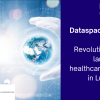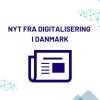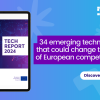Swedish AI Expert of the Year: AI accelerates the development of new medication, but legislation lags behind

In 2020, Markus Lingman, senior physician and strategist from the region of Halland, was appointed AI Expert of the Year in Sweden. His outstanding contribution to the field of AI has helped to make AI technologies, specifically within the health sector, more accessible and available. In a recent interview for TechSverige themed around AI, doctor Lingman shared some insights into how he sees the future of AI technology - and how to make sure its use and potential are maximised and used responsibly.
Lingman has previously contributed in various expert groups formed by the European Commission and the European institutions more generally, linked to health and AI. He often speaks about using healthcare data and AI technology to analyse said data and improve our understanding of accompanying medical aspects, like previous medicine intake, or comorbidities. The healthcare sector's vulnerabilities were laid bare during the COVID-19 pandemic in Europe, and experts, including Lingman, point to an alarming trend: that the current care model will not remain sustainable in the near future, and demand for novel and innovative treatments is only going up more.
An era of innovation in healthcare made possible by AI
Lingman has experience with deploying cutting-edge analytics on clinical data. His work previously helped to increase precision in care delivery in hospitals across Sweden, improving efficiency and safety together with AI's deployment and subsequent integration. This opens up possibilities that manual work simply cannot achieve: from identifying patterns in someone's overall health outlook highlighted as problematic by AI technology, or directing precious hospital resources to areas of need.
With the help of AI, doctors can now identify the risk of dangers and harmful events before they even happen - and apply preventative measures to address each crisis, saving time and money for the entire healthcare ecosystem. At the same time, Lingman admits dangers also loom ahead.
Data and ethics in an AI-driven age
Both the use, and the development, of unbiased, fair, ethical and safe AI tools highlight the need for large amounts of data. If we apply this to the context of healthcare, we are talking about data, which is sensitive 9 out of 10 times, often fragmented, and stored locally in silos. Today, it is the open data access that is the most challenging factor to unleashing the true power of AI for good in healthcare. Lingman has previously called for regulation to catch up, especially in terms of legislation guiding secondary use of data. An advocate for cloud computing expansion, Lingman believes that leveraging AI and other emerging technologies in Sweden, Europe, and beyond, can only go hand in hand with regulatory frameworks that safeguard privacy and remove exploitation biases.
AI as a gamechanger in world-class research
According to Lingman, the AI field has undergone a massive transformation in a very short time frame. He says we are only now starting to see how advanced language AI models have started going mainstream, making AI much more accessible to public. Lingman is currently based in an innovation hub for AI-based products and services in Stanford in the USA, and he says changes in the field are only growing - a trend he sees going upwards not just globally, but also in Sweden in particular. AI has come so far, that it's become an integral part of the world of research. At the same time, academic focus seems to have shifted - towards seeing how AI can bring concrete results and tangible benefits.
And while Lingman admits that many companies and research institutes are struggling with AI implementation, integration and deployment, significant progress has already taken place in key healthcare areas, such as Xray imagery.
Looking to the future: what's next for AI?
When asked about the next major steps in AI, Lingman highlights regulation again and again. And when it comes to regulation, he says it's not about regulation per se, but more about how society will deal with AI regulation:
"The big life in sectors such as health, energy and transport is likely to come when we have clear guidelines on how we regulate AI. Although legislation is under way, AI has already accelerated the development of new medicines".
And what about the current discussion and ongoing debate around AI, with many in the AI industry suggesting a temporary break in development? According to Dr Lingman, "getting the whole world to agree on a break seems unlikely". Lack of knowledge on the side of many participants in this debate means overall insight into AI remains low, together with consensus. Lingman hopes for a common regulatory approach, based on transparency and safety, shared by the main players: the US, the EU and China.
Finally, when it comes to realising the potential of AI responsibly, he stresses the idea that knowledge is power - and calls for an informed debate. In his words, "Ignorance leads to fear" and this fear can hamper the potential for AI's development, if we succumb to it.
Image: Unsplash ©






